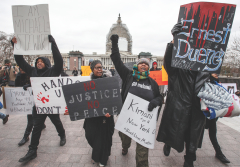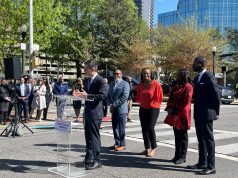 By Eric Tucker
Associated Press
By Eric Tucker
Associated Press
WASHINGTON –The Obama administration issued guidelines Monday that ban federal law enforcement from profiling on the basis of religion, national origin and other characteristics, protocols the Justice Department hopes could be a model for local departments as the nation tackles questions about the role race plays in policing.
The policy, which replaces decade-old guidelines established under the Bush administration, also will require federal agencies to provide training and to collect data on complaints.
Civil rights advocates said they welcomed the broader protections, but were disappointed that the guidelines will exempt security screening in airports and border checkpoints and won’t be binding on local and state police agencies.
“It’s so loosely drafted that its exceptions risk swallowing any rule and permit some of the worst law enforcement policies and practices that have victimized and alienated American Muslim and other minority communities,” Laura Murphy, director of the ACLU’s Washington Legislative Office, said in a statement. “This guidance is not an adequate response to the crisis of racial profiling in America.”
Though the guidelines – five years in the making – were not drafted in response to recent high-profile cases involving the deaths of Black individuals at the hands of white police officers, they’re nonetheless being released amid an ongoing national conversation about standards for police use of force, racial justice and the treatment of minorities by law enforcement.
“Particularly in light of certain recent incidents we’ve seen at the local level – and the widespread concerns about trust in the criminal justice process which so many have raised throughout the nation – it’s imperative that we take every possible action to institute strong and sound policing practices,” said Attorney General Eric Holder, referring to the August shooting by a white police officer of an unarmed Black 18-year-old in Ferguson, Missouri, and the chokehold death weeks earlier of a man in New York City.
Holder, who has made the release of the guidelines a priority before leaving the Justice Department next year, called the guidelines a “major and important step forward to ensure effective policing” by federal law enforcement.
The policy extends a ban on routine racial profiling that the Justice Department announced in 2003 under then-Attorney General John Ashcroft. Civil rights groups have long said those rules left open too many loopholes by allowing an exemption for national security and by failing to extend the ban to characteristics beyond race and ethnicity. The new guidelines would end the carve-out on national security investigations and widen the profiling ban to prohibit the practice on the basis of religion, national origin, gender, sexual orientation and gender identity.
The rules cover federal agencies within the Justice Department, including the FBI. They also extend to local and state officers serving on task forces alongside federal agents. Some activities of the Department of Homeland Security also are covered, such as civil immigration enforcement, but border and airport security screening are exempt along with interdictions at ports of entry.
The policy was laid out in a memo to law enforcement that provides concrete examples of law enforcement actions that would and would not be permissible. The memo makes clear that agents may take race, ethnicity and other factors into account during investigations in limited circumstances. Those include if they’ve received specific information linking a person of that characteristic to a particular crime or threat to homeland security.
Still, their practical impact remains to be seen, especially since local police officers are the ones primarily responsible for traffic stops, 911 emergency calls and day-to-day interactions with the communities they patrol. Though not binding on local agencies, the Obama administration views the guidelines as a road map, with Holder encouraging local law enforcement officials to adopt the federal policy.
The administration would welcome “any decision that’s made by local law enforcement to apply these policies at the state and local level as well,” White House spokesman Josh Earnest told reporters Monday.
NAACP Statement on DOJ’s Updated Racial Profiling Guidance
BALTIMORE, MD – On Monday, the Attorney General of the United States issued an update to the 2003 U.S. Department of Justice guidance regarding the use of race by federal law enforcement agencies. The NAACP has long supported the clarification of ambiguities, closing of loopholes, and elimination of provisions that allow for racial or other forms of discriminatory profiling. As such we strongly commend Attorney General Eric Holder and the U.S. Department of Justice for expanding the characteristics it protects in the 2003 guidance beyond perceived race and ethnicity, to now also include gender, religion, national origin, gender-identity and sexual orientation. We are also pleased the guidance has been expanded to include state and local law enforcement officers participating in official federal law enforcement task forces. This new racial profiling guidance also expands many areas of protection by eliminating many of the deeply problematic broad carve-outs for law enforcement activities that weekend the much needed protections in the 2003 guidance, with a few exceptions.
In addition to the U.S.D.O.J. specific provisions, the policy also applies some of the expanded anti-profiling requirements to many of the Department of Homeland Security responsibilities for the very first time. This includes all U.S. Immigration and Customs Enforcement (ICE) officers and their enforcement activities wherever they may occur. It includes law enforcement activities performed by the U.S. Coast Guard, the U.S. Border Patrol, Federal Air Marshalls, and DHS officers protecting federal buildings. As we commend DOJ and DHS on the many much needed improvements in the guidance, we look forward to working with the administration to address a number of reforms to the 2003 guidance still needed, including protections in the area of language, disability (including HIV status), housing status, occupation, and socioeconomic status.
From Cornell William Brooks, the President and CEO of the NAACP:
“We welcome the revisions and updating of the 2003 guidance on the use of race by federal law enforcement issued by Attorney General Holder. This guidance is a major and important step forward to ensure effective policing by federal law-enforcement officials, but it is one piece of many necessary long-term systemic criminal justice reforms. Now, we call on the Obama Administration to urge adoption of this guidance at the state and local law enforcement levels in all cases and not only cases where they are working with Federal task forces along with other reforms including providing specificity in data collection and training and mandating that law enforcement officers, who violate the guidance, be held criminally liable. We have painfully witnessed both in Ferguson, MO, and Staten Island, NY along with communities across the country the dangers of high levels of racial profiling, police discrimination and no accountability. Therefore, while we are encouraged by this step forward in updating this guidance, there is still significant progress to be made to end racial profiling once and for all.”
From Hilary O. Shelton, Director of the NAACP Washington Bureau and Senior Vice President for Policy and Advocacy:
“We are pleased to see this much needed improvement and expansion of the U.S. Department of Justice’s 2003 Racial Profiling Guidance. Since the beginning of the Obama administration we’ve met with Attorney General Holder and many officials at the U.S. Department of Justice and the U.S. Department of Homeland Security with the hope of seeing a new guidance that would modernize, strengthen and expand anti-racial profiling protections for all Americans. This new guidance moves the Nation a long way forward in doing just that. In short, it expands the definition of racial profiling and protections covered in the 2003 Guidance, of perceived race and ethnicity to now include gender, religion, national origin, gender-identity and sexual orientation. It also expands federal government agency accountability beyond the Justice Department to now include many of the U.S. Department of Homeland Security officers such as, U.S. Immigration and Customs Enforcement (ICE), the U.S. Coast Guard, the U.S. Border Patrol, Federal Air Marshalls, and DHS officers protecting federal buildings. We look forward to continuing our work with the Administration to see the U.S. Department of Justice Racial Profiling Guidance full implementation and further improvement.”




